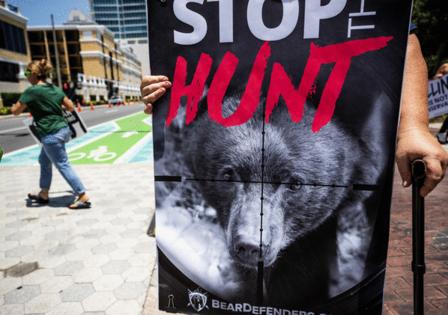Florida got 160,000 requests to hunt bears, but many applicants plan to sit out
Published in Outdoors
ORLANDO, Fla. — Florida’s wildlife agency took in more than 160,000 requests to participate in its upcoming black bear hunt, the state’s first in a decade, but many appear to have been submitted by conservationists who plan to sit out the event.
With the hunt capped at 172 animals, an application’s chance of winning a tag to bag a bear is about 1 in 1,000, according to totals released Tuesday.
Partial records from the Fish & Wildlife Conservation Commission show that both sportsmen and foes of the hunt were buying the $5 chances for the state’s lottery. Those who luck out would secure one of the 172 tags entitling them to “take” or “harvest” one bear, FWC’s terms for a kill, and every tag nabbed by a hunt foe would mean one less bear killed.
FWC said it received 163,459 applications from Sept. 12 through the deadline of 11:59 p.m. Monday Sept. 22, yielding $817,295 in permit fees.
Activists who helped organize a mass campaign for opponents to win tags have obtained a list of 75,000 of those applications so far, and guessed that tens of thousands of them emerged from their effort.
Individuals were allowed to make as many applications as they were willing to pay for; one South Florida activist, Steve Rosen, submitted at least 800. The lottery is to take place this week.
“The math seems to favor us,” said Susannah Randolph, president of the Sierra Club Florida Chapter, which sent emails to 140,000 members, urging them to “bag a tag, spare a bear.”
The not-for-profit also put together an instructional video to show members how to submit an application for the bear-tag lottery.
It had been watched more than 123,000 times as of Saturday.
“We’ve got a chance to at least save some bears with this approach, a strategy we had to use because FWC really gave us no other way to be heard,” Randolph said. “They dismissed our arguments, the public’s clear opposition and they ignored science and experts.”
State wildlife authorities estimate about 4,050 bears roam the state with a population surge in recent years led them to advocate resuming an annual hunt.
Applications for the 2025 hunt had to specify for which of four bear harvest zones the applicant was bidding. FWC received the most applications, 50,724, to hunt a bear in southwest Florida, a region that includes Collier County where 89-year-old Robert Markel and his dog were killed by a bear in May near Naples, the first fatal bear attack in state history. The harvest quota is 55.
FWC received 49,649 applications — the second most — to hunt bears in the wildlife agency’s central bear hunting zone, a 12-county region that includes Lake, Marion, Orange, Seminole and Volusia counties, where the state’s largest land mammal often wanders into neighborhoods.
The kill quota in the region is set at 18 for this year’s hunt — meaning those applications face the toughest odds of about 1 in 2,750. The number is so low because a number of other factors in Central Florida, mainly motor vehicles, contribute to bear mortality.
The wildlife agency received 34,120 requests to hunt bear in the northern zone, which has a harvest quota of 31. The region starts at the Florida-Georgia line, includes a heavily forested state wildlife management area and parts of Baker, Columbia and Suwannee counties.
An area that includes Tallahassee had the most available permits, 68, but got the fewest applications, about 29,000. That means those applications have about a 1-in-425 chance of success, the best odds.
Despite the efforts of the Sierra Club, Bear Warriors United and other groups opposed to the hunt, life-long hunter Chuck Echenique said he believes the majority of the bear-hunt tags in northern Florida and east panhandle zones will go to “real hunters.”
But anti-hunters might prevail in southwest and central Florida where opponents are more vocal and organized, he said.
“Very likely a high number of applicants in those zones are probably anti-hunting,” Echenique said.
Echenique, who spent $250 submitting bear-hunt applications, said he believes sportsmen and other hunting advocates will ultimately win out “as long as hunters maintain their cool and are patient and the hunt goes off successfully without any ‘overharvest' ...”
“I personally think after three or four years of successful hunts, the fervor will die down because the hunt is here to stay,” he said.
©2025 Orlando Sentinel. Visit orlandosentinel.com. Distributed by Tribune Content Agency, LLC.







Comments